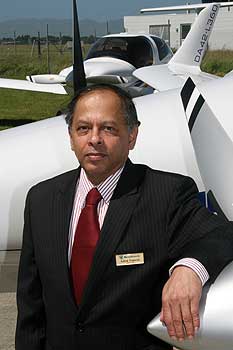Massey aviation students entered the debate over the role of GPS in basic flight training recently when they presented a safety seminar on the topic to industry.
when they presented a safety seminar on the topic to industry.
The presentation, titled ‘GPS in the New Zealand General Aviation Environment’, was created by graduates of the School of Aviation’s Flight Instructor Course as part of their group study assignment.
School of Aviation chief executive Ashok Poduval says the seminar is topical because the Civil Aviation Authority (CAA) is currently consulting on the issue of GPS in flight training.
A recently issued notice of proposed rule making by the CAA proposes that the Private Pilot’s Licence syllabus exclude the use of GPS equipment in cross-country navigation training.
Mr Poduval says the CAA is possibly concerned that pilots will become over-reliant on GPS and not learn fundamental navigation and map reading skills.
“At Massey we integrate the use of GPS progressively into the initial training programme. We use scenario-based training so students are required to deal with scenarios using basic navigation methodology, and the GPS is introduced as a supplementary aid as they progress through the syllabus.”
As a part of their assignment, the students investigated all the pros and cons of using GPS in basic flight training and reviewed overseas training syllabuses. They concluded that the technology was now so pervasive within New Zealand aviation that it would not be beneficial to exclude it from the training curriculum.
“In their conclusion to the seminar, the students say: ‘GPS is the present and the future’,” Mr Poduval says. “They argue the case for pilots to be taught both map reading and GPS skills in an integrated way from the initial stages of flight training, as this would enhance flight safety.
“Yes, basic navigation principles and methods are essential, but introducing legislation that excludes GPS training from the Private Pilot’s Licence syllabus is not going to be helpful with light aircraft increasingly using this technology.




